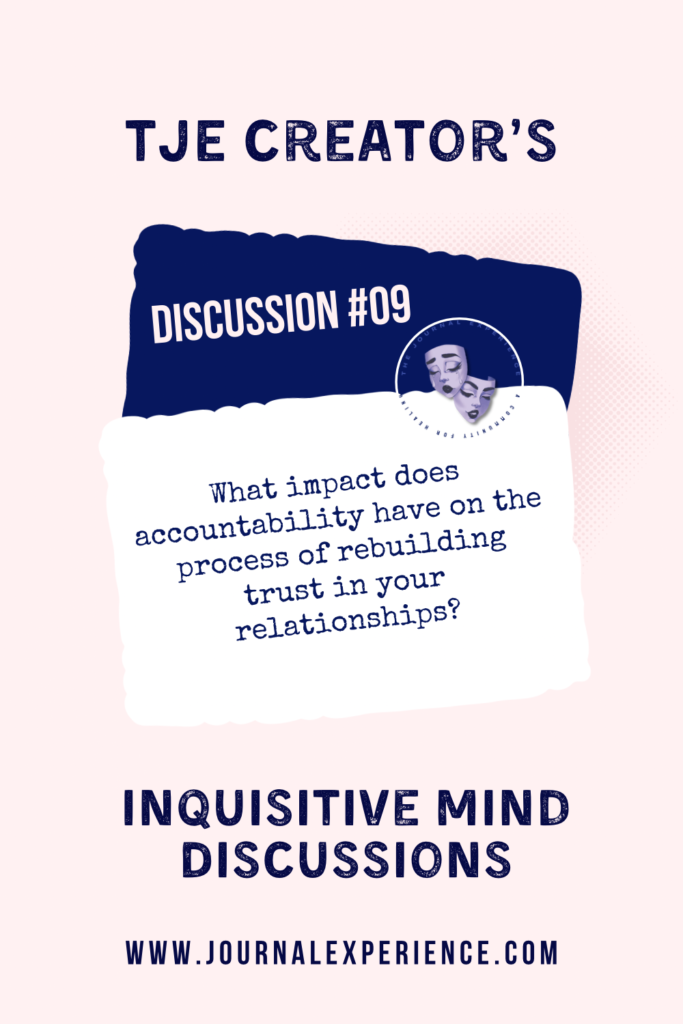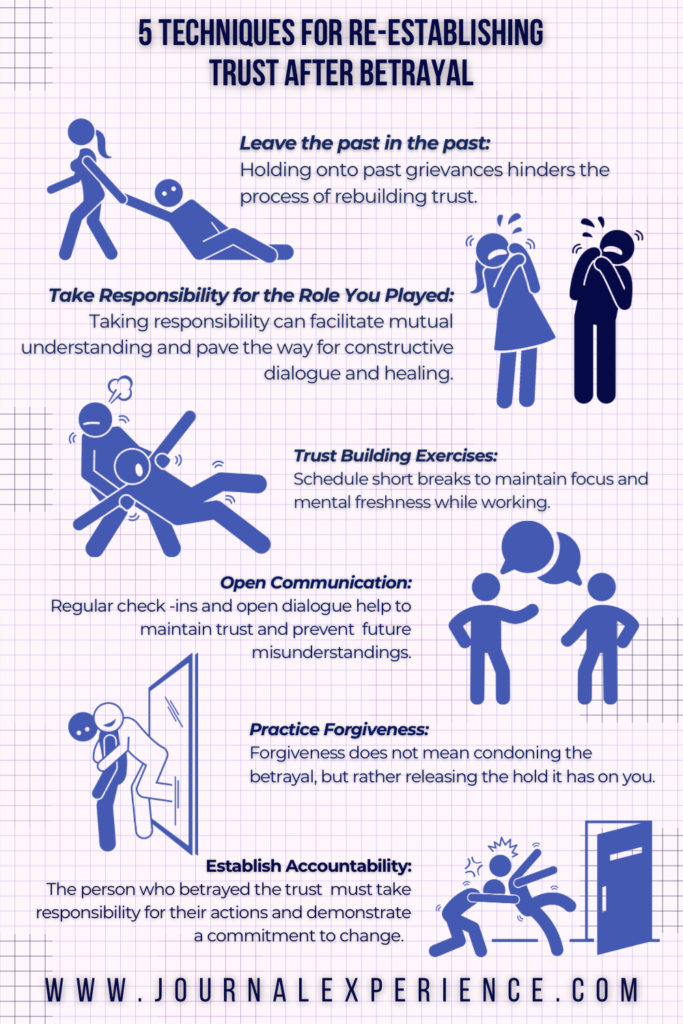In the tumultuous world of relationships, trust stands as a cornerstone. Yet, when betrayal shatters this foundation, the road to rebuilding trust after betrayal can seem daunting and overwhelming.

For those who have endured toxic relationships and toxic relationship dynamics, this journey is even more complex with emotional landmines. But be clear; while the path is challenging, it is not impossible.
However, with deliberate steps and a commitment to healing, it is possible to rebuild trust, restore peace, and cultivate healthy, fulfilling relationships.
This post is all about rebuilding trust after betrayal.
Trust After Betrayal
Navigating the Path to Recovery: Strategies for Healing
The effects after betrayal often leaves a tangled web of emotions. From excessive anger and confusion to grief and self-doubt, navigating these feelings is crucial in the process of rebuilding trust after betrayal.
Start by acknowledging the pain and allowing yourself to grieve. It’s essential to understand that these emotions are valid and that healing is a gradual process.
- Identify and Acknowledge the Pain: The first step in recovery is to recognize the hurt caused by the betrayal. This might involve reflecting on the relationship, journaling, or speaking with a trusted friend or therapist.
Naming your feelings can be cathartic and helps in processing the betrayal. For instance, writing about your experiences in a journal can clarify your emotions and provide a sense of relief.
- Set Boundaries: Establishing clear boundaries is crucial in the recovery process. Whether it’s limiting contact with the person who betrayed you or setting new rules for your interactions, boundaries help protect your emotional well-being and create a safe space for healing.
Consider how maintaining distance can prevent further harm and help you focus on your healing journey.
- Seek Support: Don’t hesitate to lean on your support network. Friends, family, or support groups can offer a sense of solidarity and understanding.
Professional help, such as counseling or therapy, can also provide valuable tools and strategies for coping with the betrayal and moving forward.
For example, cognitive-behavioral therapy (CBT) can help you reframe negative thoughts and develop healthier coping mechanisms.
Want expert guidance that helps you reconnect with safety, trust, and emotional clarity?
The Thrive in Love Online Course offers trans formative tools for individuals or couples seeking to rebuild connection after emotional damage.
- Engage in Self-Care: Prioritize activities that nurture your well-being. This could include exercise, meditation, hobbies, or simply taking time for yourself.
Self-care helps to rebuild your self-esteem and reminds you that you deserve love and respect. Imagine engaging in a favorite hobby like painting or hiking, which can provide a sense of accomplishment and joy.

Building Bridges: Techniques for Re-establishing Trust
Once the initial shock of betrayal subsides and you begin to heal, the focus shifts to re-establishing trust. This phase is critical and involves both introspection and practical actions to rebuild trust after betrayal. Here are some strategies to guide you:
- Leave the Past in the Past: Holding onto past grievances hinders the process of rebuilding trust. Focus on the present and future, and avoid rehashing old issues. This helps create a forward-looking perspective and fosters a more positive environment for rebuilding trust.
- Take Responsibility for the Role You Played: Reflect on your own actions and acknowledge any part you may have played in the situation. Taking responsibility can facilitate mutual understanding and pave the way for constructive dialogue and healing.
- Trust-Building Exercises: Engage in activities that foster trust and communication. These might include shared projects, honest conversations, or exercises designed to rebuild connection.Activities like “truth time,” where both partners share /feelings openly, can facilitate understanding and rebuild trust. For instance, setting aside regular “check-in” times can help both partners discuss their feelings and concerns without judgment.
Need structured exercises, trust rituals, and connection guidance?
Attend the 3 Day Thriving Relationship Workshop—a supportive space for couples to rebuild trust, communication, and emotional safety.
- Open Communication: Trust hinges on transparency and honesty. Create a safe environment where both parties feel comfortable expressing their thoughts and feelings.
Regular check-ins and open dialogue help to maintain trust and prevent future misunderstandings. Think about establishing a routine where you discuss your day and any issues openly, fostering a deeper connection.
- Practice Forgiveness: Forgiveness does not mean condoning the betrayal, but rather releasing the hold it has on you. It allows you to move forward without being weighed down by anger or resentment.
This can be one of the most challenging steps, but it is crucial for rebuilding trust. Imagine forgiving as a way to free yourself from the burden of past hurts, allowing space for healing and growth.
- Establish Accountability: Rebuilding trust requires accountability. The person who betrayed the trust must take responsibility for their actions and demonstrate a commitment to change.
This includes following through on promises, being consistent in their behavior, and being patient with the healing process.
Consider creating a “trust contract” where both parties outline their commitments and the steps they will take to rebuild trust.
Weathering the storm: Coping Mechanisms for Betrayal
The emotional turmoil following betrayal can feel like a relentless storm. However, employing effective coping mechanisms can provide a lifeline. Here’s how to weather the storm and emerge stronger:
- Emotional Coping Strategies: Allow yourself to experience and express your emotions. Bottling up feelings can lead to additional stress and hinder your healing.
Techniques such as mindfulness, breathing exercises, and emotional journaling can help manage overwhelming emotions and provide a sense of calm. For example, practicing deep breathing exercises during moments of stress can help center your thoughts and reduce anxiety.
- Engage in Physical Activity: Physical exercise is a powerful way to alleviate stress and improve your mood. Whether it’s a vigorous workout, a yoga session, or a simple walk in nature, moving your body helps to release built-up tension and foster a sense of well-being.
Imagine taking a brisk walk in the park, letting the fresh air and scenery clear your mind and lift your spirits.
- Develop a Support System: Connect with others who understand your experience. This might include joining support groups or engaging in therapy sessions.
Sharing your journey with others can provide validation and reduce feelings of isolation. For instance, participating in a support group for those who have experienced betrayal can offer a sense of community and shared healing.
- Practice Self-Compassion: Be kind to yourself and recognize that healing takes time. Self-compassion involves treating yourself with the same empathy and understanding that you would offer a friend in a similar situation.
It helps to counteract the negative self-talk that often accompanies betrayal. Picture yourself comforting a friend who is hurting; now, extend that same kindness and patience to yourself.

Nurturing Healthy Relationships: Expert Advice for Moving Forward
As you heal and rebuild trust, it’s essential to nurture relationships that are healthy and supportive. Here’s how to move forward with confidence and resilience:
- Learn from the Past: Reflect on your past experiences and consider what lessons they have taught you. Understanding the dynamics that led to the betrayal can help you avoid similar situations in the future and foster healthier relationships. Think about the patterns or red flags you may have overlooked and how you can recognize them in future relationships.
- Set Clear Expectations: Establishing clear expectations in your relationships helps to prevent misunderstandings and foster trust.
This includes being open about your needs, setting boundaries, and ensuring that both parties are on the same page regarding commitment and behavior. Consider having open discussions about what trust means to each of you and how you can uphold it.
- Invest in Relationship Skills: Building a strong relationship requires ongoing effort and communication. Engage in activities that strengthen your connection, such as attending relationship workshops, reading books on relationship skills, or seeking advice from relationship experts.
For example, attending a workshop on effective communication can provide tools for expressing needs and resolving conflicts constructively.Strong relationships aren’t just felt—they’re built.
Looking to strengthen your foundation for future love?
The Thrive in Love Weekend Couples Retreat (in person) helps couples (or even solo attendees) cultivate healthier communication, emotional intimacy, and practical trust-building skills.
- Focus on Growth and Healing: Embrace the journey of personal growth and healing. Focus on activities and practices that promote emotional and mental well-being.
This might include therapy, self-help resources, or personal development courses. Imagine taking a course on mindfulness to better manage stress and enhance your overall well-being.
- Build a Network of Healthy Relationships: Surround yourself with people who support and uplift you. Healthy relationships are characterized by mutual respect, empathy, and open communication.
Cultivating a network of supportive friends and family can provide a solid foundation for your emotional well-being. Think about nurturing friendships that inspire you and contribute positively to your life. Who surrounds you matters. Choose relationships that mirror your growth, not your trauma.
Want guidance on creating your own relational blueprint?
The Thriving Relationship Coach Certification isn’t just for future coaches—it’s also ideal for individuals wanting to deeply understand relationship health and emotional resilience.
Overview
Rebuilding trust after betrayal is a challenging but achievable goal. By navigating the path to recovery with intentionality and patience, you can heal from the pain of betrayal and cultivate relationships that are rooted in trust and respect.
Whether you are recovering from toxic relationships or seeking to build stronger bonds, the steps outlined above provide a roadmap to recovery and a foundation for healthier, more fulfilling connections.
Remember, the journey may be long, but each step you take brings you closer to a place of healing and peace.

Take this opportunity for growth, and trust that with time and effort, you can rebuild trust and forge deeper, more meaningful relationships. Subscribe to our newsletter for exclusive insights and practical steps towards healing and cultivating healthy relationships !